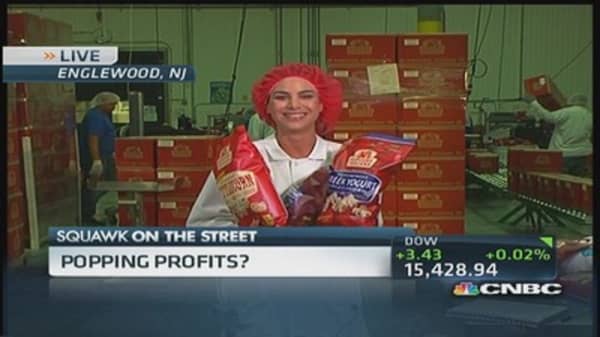Is the popcorn business popping profits? The folks at Popcorn, Indiana—America's No. 1 Kettlecorn in the independent market—sure think so. Sales at this privately held company are roughly $100 million a year and rising, as ready-to-eat popcorn snacks are gaining popularity with consumers.
"The snack market is about $16 billion or so in size, the ready-to-eat popcorn business is about a half a billion dollars in size—but it's been growing at a faster clip than the overall snack market," said Hitesh Hajarnavis, president and CEO of Popcorn, Indiana.
And the growth in the industry is staggering. Over the past four years, the compound annual growth rate has been about 4 percent. In the past year the market has grown in the low double digits, and many analysts estimate that these numbers will continue to climb.
"I think this half-a-billion-dollar ready-to-eat popcorn market will probably double itself in size over the next eight to 10 years. In the same period where the market has grown 4 percent, we have delivered about a 30 percent annual compound growth rate, " said Hajarnavis.
Part of the draw in the popcorn business is the health benefits of the snack. Popcorn, Indiana's products are all-natural, gluten-free and non-GMO; they also don't have trans fats and some varieties offer dieter low-carb options.
(Read more: Struggling to survive: Flower stores wilting)
"Sixty percent of the people in America consume snacks. Yet, 87 percent are looking for healthier snacks. So everybody's looking for that healthy snack piece and I think people are gravitating towards popcorn because the inherent benefit of popcorn is getting more and more widely known," said Hajarnavis.
But the popcorn business can be very competitive. The No. 1 player in the overall market is Smartfood, owned by Frito-Lay, which is a unit of PepsiCo. Still, Popcorn, Indiana is No. 2 in the overall space and in the past four years alone, the company has delivered about 28 percent of the overall market's growth.
Hajarnavis says it's all about making great-tasting products, which are developed in the company's on-site test kitchen.
"You want to eat it because you enjoy it, you have fun. So we go about it from that standpoint. Whatever we put out has to taste great and we are, I think, the harshest critics of that particular standard," he said.
Popcorn, Indiana has seen its business evolve since it launched in 2002. In 2006, the company switched from a retail-based model to a wholesale-based model, which has proven to be profitable.
(Read more: Two New Yorkers find fortune in meatballs)
"We started off as a retail-oriented business, that means we had our own stores. And the insight we had was 'We make great-tasting popcorn, the stores were doing phenomenally well, but they're limited.' I said, 'Why don't we take this to the rest of the Americans who are out there?' And the best way to do that is to sell our popcorn at the large retail stores, whether it's grocery stores or big-box stores," said Hajarnavis.
And retailers as well as consumers have embraced the brand. Popcorn, Indiana is in all the Whole Foods in the country, all the Wal-Mart Supercenters in the country as well as all the Walgreen stores in the country. And as Hajarnavis put it, "that's only the stores that begin with a W."
Popcorn, Indiana's greatest challenge is to stay ahead of the curve. How do they do it?
"I think the way we will do that is by A) delivering great-tasting products like we do today, so not screwing that up. And B) continuing to innovate—just trying to figure out what the next thing is that people will want to eat and coming out with those great-tasting snacks," said Hajarnavis.
—By CNBC's Jackie DeAngelis.





